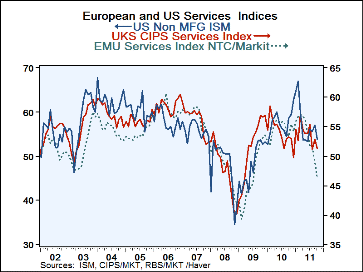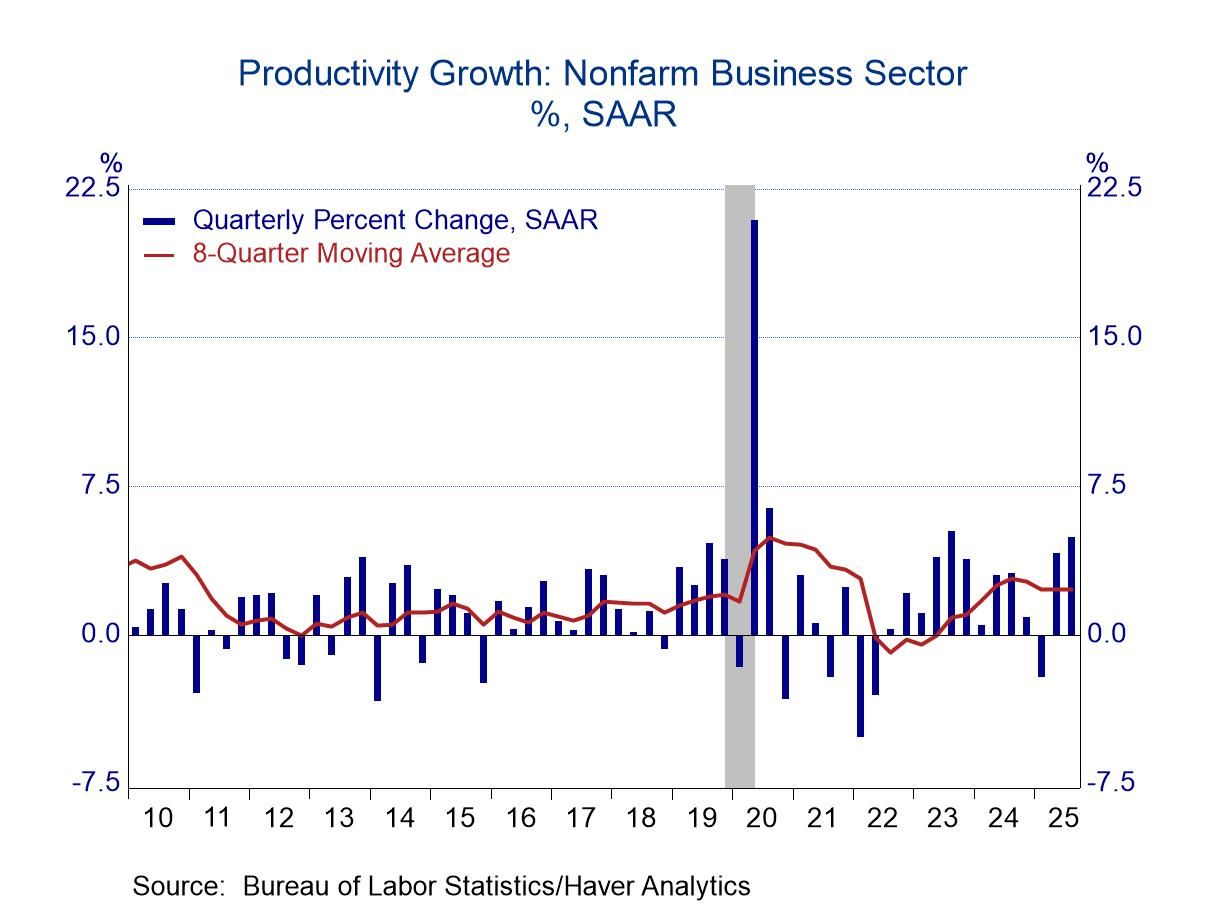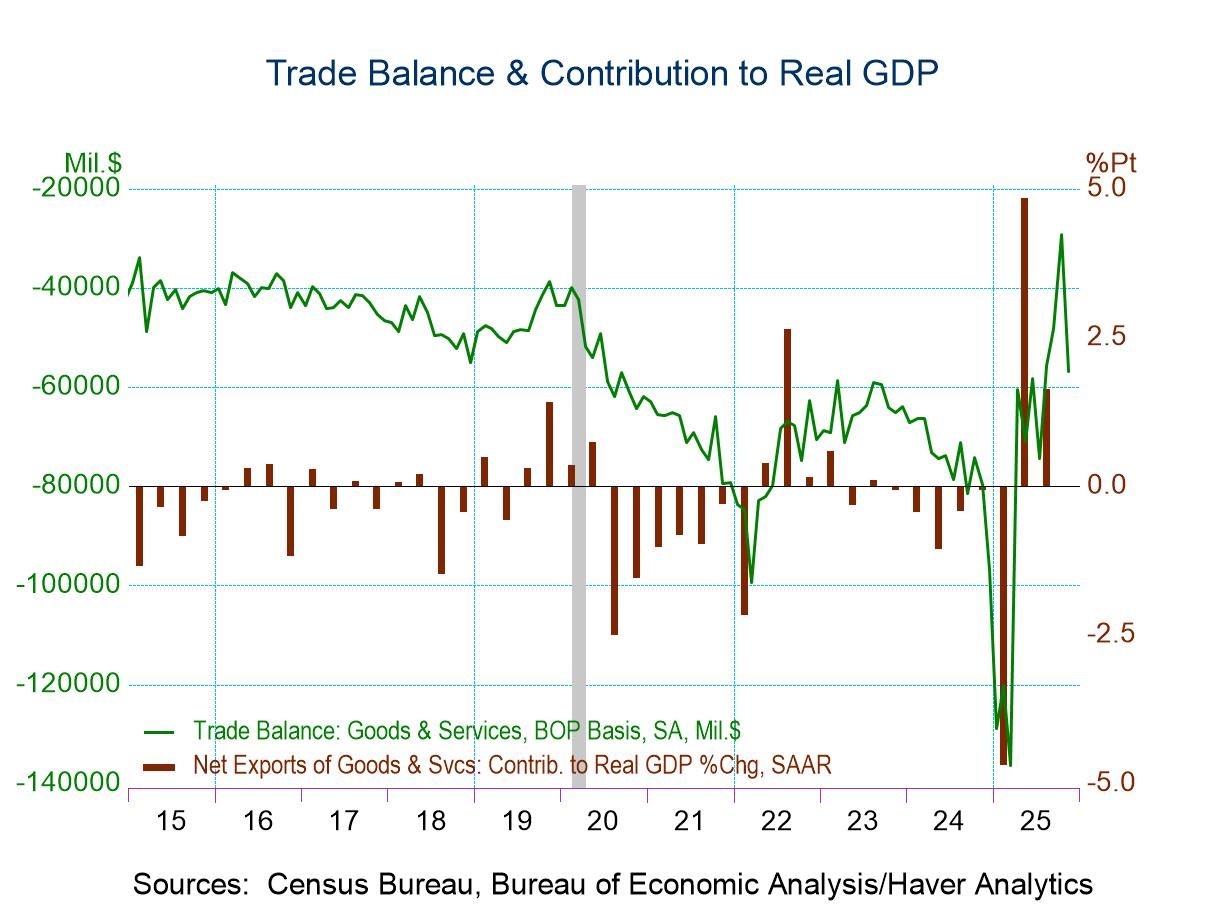 Global| Nov 04 2011
Global| Nov 04 2011Europe Service Sector in Steep Drop
Summary
EMU no longer ‘at your service’- The Euro-Area service sector survey from Markit registered a sharp drop in October. It comes on the heels of a sharp drop in September. The two month drop of over five points in the services sector [...]
 EMU no longer ‘at your service’- The Euro-Area service sector survey from Markit registered a sharp
drop in October. It comes on the heels of a sharp drop in September. The two month drop of over five
points in the services sector index is the SECOND worst in the history of the survey. It was only
exceeded by a two month drop in Oct-Nov of 2008 in the depths of the recent financial crisis. That
is not very comforting is it?
EMU no longer ‘at your service’- The Euro-Area service sector survey from Markit registered a sharp
drop in October. It comes on the heels of a sharp drop in September. The two month drop of over five
points in the services sector index is the SECOND worst in the history of the survey. It was only
exceeded by a two month drop in Oct-Nov of 2008 in the depths of the recent financial crisis. That
is not very comforting is it?
The real thing - Europe’s unraveling is for real. While the service sector in Germany did manage to fight its way back to a plus reading it too is under a great deal of pressure and will take little solace from its reading of 50.63 in October.
Historic context: ick! - Putting the EMU service sector readings in the context of an historic ranking we find grim results awaiting. The overall EMU service sector has been weaker than its current reading only 7.6% of the time. France has been worse 3% of the time; Italy has been worse 6% of the time; Spain has been worse 11% of the time- these are terrible readings. Germany has been worse 33% of the time but that still leaves it at the bottom one-third of its range. The UK, an EU member (not EMU member), has been lower 54% of the time a neutral reading with a raw reading of 51.31. The percentiles look decent when we look at where this month stands relative to their respective high-low range (right hand column in the table) but that is misleading. The queue or ranking percentiles are a more demanding lot of data and they put the EMU readings in their place, much farther down the line.
Weakness is real, confirmed elsewhere - We see that sense of weakness reflected in the ongoing weak consumer sentiment figures by country. As in the US consumer sentiment remains weak in Europe. Italy has its lowest reading Since May 2000. France’s reading is the bottom 20% of its queue; the UK is in the bottom 10% of tis queue. Spain is somewhat better-off in the lower 30th percentile of tis queue. In Germany confidence is much more buoyant in the 70th percentile of its queue HIGHER than this only 30% of the time, But Germany’s readings have been eroding.
Zone’s usefulness is history - The Euro-debt situation is taking a huge toll on the real sector of the Euro-economy. The region does not know what to do. I think the Zone has outlived its usefulness under its current membership and what EMU has showed us is who can stay with Germany and who cannot. It has been a useful experiment but has run its course.
Should they stay or should they go? Keeping the Greece’s and Spain’s and Portugal’s and maybe even the Italy’s in with Germany creates a Zone with great tension. These countries have lost a lot of competitiveness since being yoked to Germany since they have joined the Euro-Area. Traditionally when these competiveness losses built up in these countries they devalued their now-abandoned currencies. But now they cannot, do that anymore...so what can they do other than to leave the Zone? Had they wanted to stay they should have controlled their costs, their inflation, their budgets, and boosted their productivity but now there is no going back. No use crying over spoiled yogurt.
The too-long too-steep road of austerity - Even if these countries were able to put down the hammer domestically and did not lose any more competitiveness to Germany, matching its inflation tick-by-tick as well as its productivity growth – and that would be a startling achievement- they would trail German competitiveness by up to 25%. Why would Greece pay such a great price to continue to be crushed by Germany in head to head competition in the Zone? Or why would Spain? Or why would Portugal?
The too-long too-steep road of austerity - Even if these countries were able to put down the hammer domestically and did not lose any more competitiveness to Germany, matching its inflation tick-by-tick as well as its productivity growth – and that would be a startling achievement- they would trail German competitiveness by up to 25%. Why would Greece pay such a great price to continue to be crushed by Germany in head to head competition in the Zone? Or why would Spain? Or why would Portugal? Beware of Greeks bearing the right to vote. This is good for France and Germany, since it might stop the contagion (for a while), and since each of them remain at a strong comparative advantage VS their struggling Mediterranean neighbors. So who is fooling whom here and who is being helped by whom? Interesting questions, these are, and ones that are not likely to be answered honestly any time soon. History will take a crack at them later, and France and Germany are not likely to be wearing the ‘white hats’ in that rendition.
| Various looks at the UK, EU and EMU Services Sector | |||||||
|---|---|---|---|---|---|---|---|
| Oct-11 | Sep-11 | Aug-11 | 3Mo | 6Mo | 12Mo | %ile | |
| Euro-Area | 46.40 | 48.84 | 51.48 | 48.91 | 51.33 | 53.69 | 33.4% |
| Germany | 50.63 | 49.69 | 51.08 | 50.47 | 52.84 | 55.94 | 47.4% |
| France | 44.63 | 51.47 | 56.84 | 50.98 | 54.29 | 56.37 | 19.6% |
| Italy | 43.87 | 45.81 | 48.36 | 46.01 | 47.37 | 49.77 | 25.1% |
| Spain | 41.76 | 44.76 | 45.20 | 43.91 | 46.55 | 47.76 | 42.1% |
| Ireland | 51.50 | 51.35 | 51.07 | 51.31 | 51.43 | 51.42 | 57.4% |
| EU only | |||||||
| UK (CIPs) | 51.31 | 52.85 | 51.15 | 51.77 | 53.07 | 53.30 | 54.9% |
| Percentile is over range since May 2000; Ireland has not reported a Jul #, we use June | |||||||
| EU Commission Indices for EU and EMU | |||||||
| EU Index | Oct-11 | Sep-11 | Aug-11 | 3Mo | 6Mo | 12Mo | %ile |
| EU Services | -3 | -4 | -1 | -18.67 | -14.50 | -12.58 | 40.0% |
| EMU | Oct-11 | Sep-11 | Aug-11 | 3Mo | 6Mo | 12Mo | %ile |
| Services | 0 | 0 | 4 | 1.33 | 5.17 | 7.67 | 50.0% |
| Cons Confidence | -20 | -19 | -17 | -18.67 | -14.50 | -12.58 | 40.0% |
| Consumer Confidence by Country | |||||||
| Germany-Ccon | -3 | -2 | 0 | -1.67 | 3.67 | 6.50 | 68.2% |
| France-Ccon | -24 | -28 | -26 | -26.00 | -21.83 | -20.17 | 32.5% |
| Ital-Ccon | -34 | -31 | -29 | -31.33 | -28.17 | -26.17 | 0.0% |
| Spain-Ccon | -20 | -17 | -17 | -18.00 | -15.83 | -18.25 | 59.6% |
| UK-Ccon | -24 | -22 | -20 | -22.00 | -19.33 | -20.25 | 28.9% |
| Percentile is over range since May 2000 | |||||||
Robert Brusca
AuthorMore in Author Profile »Robert A. Brusca is Chief Economist of Fact and Opinion Economics, a consulting firm he founded in Manhattan. He has been an economist on Wall Street for over 25 years. He has visited central banking and large institutional clients in over 30 countries in his career as an economist. Mr. Brusca was a Divisional Research Chief at the Federal Reserve Bank of NY (Chief of the International Financial markets Division), a Fed Watcher at Irving Trust and Chief Economist at Nikko Securities International. He is widely quoted and appears in various media. Mr. Brusca holds an MA and Ph.D. in economics from Michigan State University and a BA in Economics from the University of Michigan. His research pursues his strong interests in non aligned policy economics as well as international economics. FAO Economics’ research targets investors to assist them in making better investment decisions in stocks, bonds and in a variety of international assets. The company does not manage money and has no conflicts in giving economic advice.






